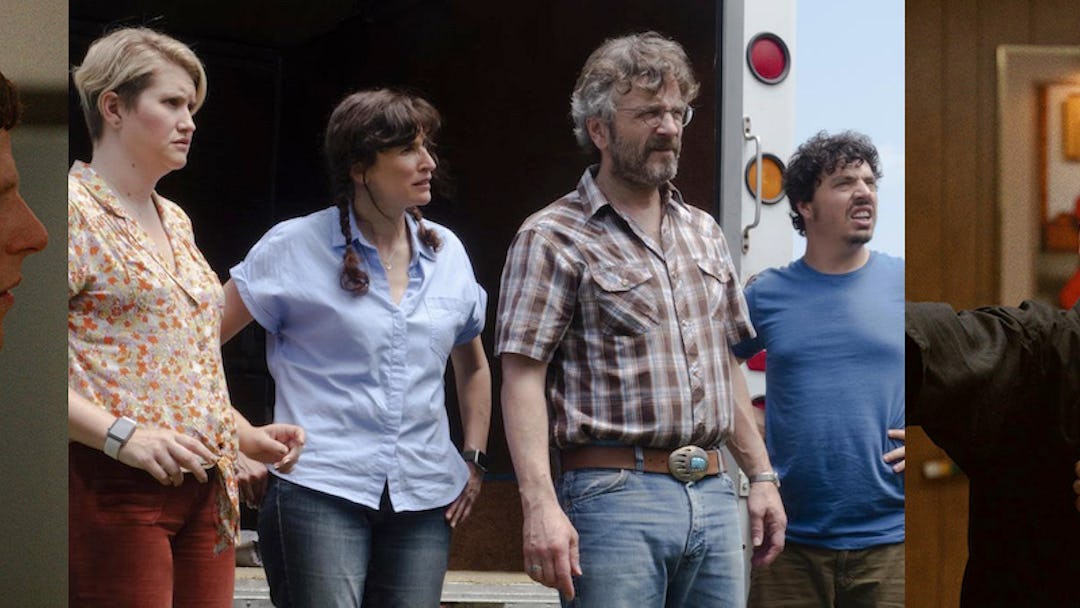These are strange times for comic filmmakers. Big-screen laughers have been in curiously short supply this year, and many of those that have made their way to the screen – Long Shot, The Hustle, Shaft, Poms, Booksmart, Late Night – have underperformed. (Look for this week’s Stuber to continue that trend.) The explanation, like so many in this movie-going moment, may lie in the Streaming Effect; with so much great comedy available at the click of a button and the cost of a subscription service, it’s tougher and tougher to justify the cost of a movie ticket.
But it’s also increasingly difficult to get a firm grasp on what kind of comedy people want to see in this very specific, sociopolitical moment. These correlations exist, and always have: audiences famously took to the sophisticated screwball comedies of the 1930s as an escape from the woes of the depression; embraced the anarchical tendencies of Chevy Chase, Bill Murray, and their SNL brethren as moral restrictions tightened in the Reagan ‘80s; Will Ferrell and company took the “unapologetic dumb guy” energy of George W. Bush (and Ferrell’s impression of same) into the movie comedies of the 2000s.
So what does that leave us with now? How does movie comedy respond to an age of despair bordering on nihilism, with more than half of the country in a state of near-constant depression?
Two new indie comedies, both out this week after successful bows at SXSW last spring, offer differing approaches. Lynn Shelton’s Sword of Trust and Riley Stearns’s The Art of Self Defense are, on a surface, narrative level, similar stories, in which mild-mannered, affable protagonists are confronted with the horrors of life in Trump’s America. But the tacks taken by the filmmakers – and their protagonists – are radically, tellingly different.
Sword of Trust concerns Mary (Michaela Watkins) and Cynthia (Jillian Bell) a young couple who come into possession of an antique sword. The sword, left to Cynthia by her deceased grandfather, seems utterly worthless – but it’s worth a great deal to a subset of fringe conspiracy theorists, Civil War “truthers” who are convinced the sword, somehow, “proves” the South won the war. They seek help from Mel (Marc Maron), a local pawnshop owner, and end up participating in what he dubs an “Antiques Road Show for racists.”
The film is set, and was shot, in Alabama, and Shelton’s evocative images of the town and keen eye for casting lends the picture a sense of authenticity; the locals’ dialogue (much of it reportedly improvised) sounds overheard. But she’s also tapping into a real sense of fear and discomfort about these regions and the presumptions outsiders make about them now. This is Trump country. These people are capable of anything.
The Art of Self-Defense was shot in Louisville, Kentucky, but isn’t explicitly Southern – it’s set nowhere in particular, Anytown U.S.A. Jesse Eisenberg stars as Casey, a painfully awkward office type with no friends, no social life, and frankly, no personality. One night, while retrieving food for his dog, he’s brutally beaten by a gang of motorcycle-riding toughs; after an extended hospital stay, he decides he must learn how to defend himself. “I’m afraid of other men,” he explains. “They intimidate me. I want to be what intimidates me.”
He makes this confession to his Sensei (Alessandro Nivola), who runs the karate school were Casey finds his newfound sense of purpose and tough-guy moxie. Sensei loves making faux-thoughtful pronouncements, like “forget everything you know” and “karate is a language,” and Casey sees him as not only a source of practical instruction, but life wisdom. Yet there’s more than that; he also sees Sensei as a source of affirmation, valuing the occasional praise offered by the kind of “real man” that usually intimidates him.
The style and tone of the two pictures is radically different; Sword is laid-back and free-wheeling, affable in approach and production, with a shambling, loose spirit, while Self-Defense feels tightly constructed, slow-fused, ready to explode. (If I may use Seth Rogen to make a point: Sword of Trust is to Knocked Up as The Art of Self-Defense is to Observe and Report). The protagonists of Sword find themselves on a white nationalist compound, and while it’s nerve-racking, there’s no real sense of danger, because it’s not that kind of movie. But by the third act of Self-Defense, it not only feels like someone’s going to die, but that someone has to.
So in a way, entirely accidentally, this week’s indie comedies serve as a kind of litmus test; the one you respond to says a lot about who you are. In the Shelton film, deeply scary people walk among us, but they’re more than likely toothless and/or grifters, clinging to outdated ideas, dinosaurs voicing their final, dying squawks. In the Stearns, toxicity and destructiveness are not only pervasive but infectious, might makes right, and we’re all probably doomed. Personally, I engaged with and enjoyed both pictures roughly equally. But the more I think about it, the more it feels like Sword of Trust is a movie about who we’d like to think we are, and The Art of Self-Defense is the movie about what we’ve become.
“Sword of Trust” opens in New York on Friday, and in additional cities and on demand July 19th; “The Art of Self-Defense” opens Friday in limited release and expands on July 19th.
